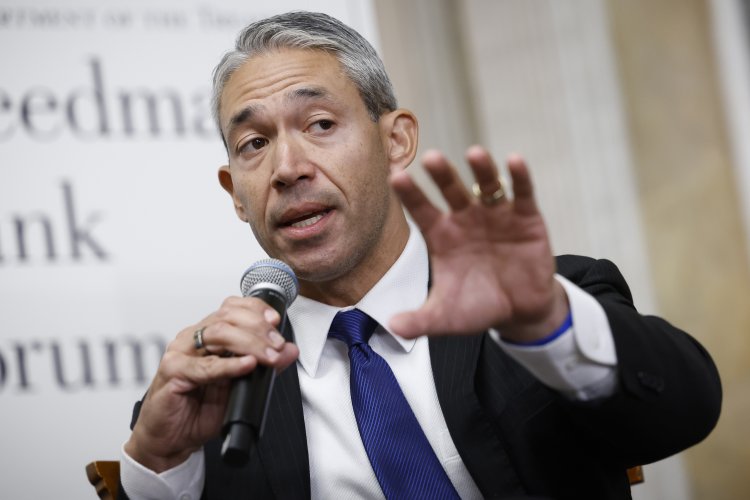San Antonio's Mayor Strives to Strengthen Ties with Canada; Warns Tariffs Could Cripple Local Economy
Ron Nirenberg expressed skepticism about the notion of achieving prosperity through isolation, stating, "The idea that all of a sudden we can become isolated and maintain prosperity for our people is just ludicrous."

According to Mayor Ron Nirenberg, the new tariffs implemented by President Donald Trump threaten “300,000 jobs immediately on the block,” putting one in five jobs in jeopardy within the state.
The Canadian Chamber of Commerce has identified San Antonio, alongside Detroit and Kansas City, as a top U.S. city that relies heavily on Canadian exports. Cities like Atlanta, Pittsburgh, and Seattle are also included in this ranking. Chamber economist Andrew DiCapua explained that the study was intentionally framed to emphasize the potential impacts on local economies.
“Hearing prices are going to go up is one thing,” he told PMG. “But if you say that as a result of trade frictions, your business sales will go down, stores and plants will close, you're going to have a recession in your local economy and you're not going to have a job — that's a lot more powerful.”
We spoke with Nirenberg on Tuesday, just hours before Trump’s global tariffs were enacted. Canada did not face the “Liberation Day” sweep, but it has been affected by tariffs on automobiles, steel, and aluminum, with further measures expected. On April 9, Canada announced countermeasures targeting U.S. vehicles.
"The reality is the modern economy does not exist without cooperation in the globe — across the globe," Nirenberg noted to PMG. "So the idea that all of a sudden we can become isolated and maintain prosperity for our people is just ludicrous."
The following is a summary of his thoughts, condensed for clarity.
When asked about the Canadian Chamber of Commerce ranking San Antonio as the top U.S. metro area dependent on Canadian exports, Nirenberg responded that he was not surprised. He highlighted, “Our economy has transformed over the last 25 years as a result of a diversification of industries, but significantly the rebirth of the manufacturing sector as a result of free trade in North America. It has rebuilt the middle class, and it employs tens of thousands of San Antonio workers, becoming the leading employment sector in our city."
Regarding his concerns, Nirenberg expressed “grave concern — and a tremendous amount of anger at the combination of malice and incompetence coming out of the White House.”
He mentioned hearing from the local business community, particularly small businesses that are struggling to navigate the complexities of trade. “The reality of a lot of these businesses is that they are grinding every single day. It's hard enough to forecast purchases, supplies and fluctuations in payroll without the escalating trade wars,” he noted, while mentioning the reticence of some to voice their concerns due to fear of retaliation.
On the topic of a “Buy Canadian” movement he hasn't witnessed personally, Nirenberg stated, “There's nothing that spurs patriotism like being attacked. And we are unfortunately seeing the White House make unprovoked attacks on our strongest allies.”
Reflecting on Canada’s diplomatic efforts, he shared that last year he engaged with Canadian officials at various levels and emphasized the importance of these connections. While discussing his trip to Quebec City and the Friendship City agreement he established with Mayor Bruno Marchand, he said, “I'm a former chairman of Sister Cities International. I believe very strongly that the relationships that are formed between communities — citizen to citizen, business to business — are the most important bridges that we build if we're going to have a future where there's peace between countries and not conflict.”
Addressing concerns about diminishing trust, Nirenberg acknowledged this sentiment, saying, “The United States has been the pillar of democracy, freedom, liberty for many generations, and the malice of one man is changing that reputation almost overnight.” He remained hopeful about restoring trust, but recognized the effort required to do so.
As for the future of the USMCA in light of the shifting trade landscape, he expressed optimism: “I sure hope so. NAFTA certainly had its flaws, but it opened up trade relationships that hadn't existed and helped spur the rebirth of many industries in the United States and Canada and Mexico.” He concluded, “It’s the framework of how we can create a more efficient, effective and fair economy throughout the continent, and one of the reasons why I believe the alliances were so strong and the three countries were secure.” He noted, “I thought that President Trump believed the same thing when he renegotiated the darn thing.”
Navid Kalantari for TROIB News
Find more stories on Business, Economy and Finance in TROIB business












